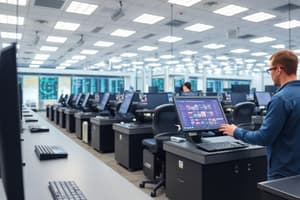Podcast
Questions and Answers
What is a Transaction Processing System?
What is a Transaction Processing System?
An information system that captures and processes business transaction data in supporting a business organization's day-to-day operations.
Where is the Transaction Processing System located?
Where is the Transaction Processing System located?
Lower part, it is for every functional area.
What is the importance of TPS?
What is the importance of TPS?
It is the earliest type of information system and the fundamental system of an organization.
Which of the following are characteristics of a TPS? (Select all that apply)
Which of the following are characteristics of a TPS? (Select all that apply)
Is the CSUS enrollment system a TPS?
Is the CSUS enrollment system a TPS?
What are the approaches for Data Entry?
What are the approaches for Data Entry?
What are the Automated Data Entries?
What are the Automated Data Entries?
What is source data automation?
What is source data automation?
What are examples of Data Automation Equipment? (Select all that apply)
What are examples of Data Automation Equipment? (Select all that apply)
What is Electronic Data Interchange?
What is Electronic Data Interchange?
EDI is a _____ form of computer-to-computer _______.
EDI is a _____ form of computer-to-computer _______.
What was EDI virtually synonymous with before the widespread deployment of internet-based technologies?
What was EDI virtually synonymous with before the widespread deployment of internet-based technologies?
What are the shortcomings of traditional EDI?
What are the shortcomings of traditional EDI?
Which of the following are characteristics of EDI? (Select all that apply)
Which of the following are characteristics of EDI? (Select all that apply)
What are the direct benefits of EDI?
What are the direct benefits of EDI?
Flashcards are hidden until you start studying
Study Notes
Transaction Processing System (TPS) Overview
- A transaction processing system captures and processes business transaction data to support daily operations of organizations.
- Focuses on information rather than physical exchanges, incorporating data processing and electronic data processing.
Location and Coverage of TPS
- Positioned at the lower part of organizational systems.
- Essential for every functional area including manufacturing, marketing, accounting, finance, and human resources.
Importance of TPS
- The earliest form of information systems and fundamental for organizational functioning.
- Examples include registration systems, student transcript systems, payroll processing, and accounts receivable/payable systems.
Major Characteristics of TPS
- Processes large amounts of data, often in batch mode.
- Requires significant storage capacity and high processing speeds to handle volume efficiently.
- Mainly utilizes internal data sources with outputs intended for internal audiences, though external data contributions are increasing.
- Regular data processing (daily, weekly, etc.) and monitoring of past data.
- Structured input and output data formatted in a standard manner with a focus on detailed raw data.
- Low computational complexity involving simple mathematical operations.
- High accuracy, data integrity, and security are crucial, with privacy concerns strongly tied to TPS.
- Reliability is critical, serving as the organization's "lifeblood"; interruptions can be detrimental.
- Inquiry processing capabilities enable users to query databases and filters in real time.
Case Study: CSUS Enrollment System
- Confirmed to be a transaction processing system.
Data Entry Approaches
- Identified as a bottleneck in transaction processing.
- Approaches to data entry include manual methods or automated (computerized) systems to minimize resource usage.
Automated Data Entries
- Includes source data automation and electronic data interchange (EDI).
Source Data Automation
- Involves capturing data immediately after transactions occur.
- Emphasizes capturing data close to the source generating it using machine-readable media.
Data Automation Equipment
- Image scanners convert text/images into digital data using Optical Character Recognition (OCR) software.
- Optical recognition technology processes marks, codes, and characters, exemplified by barcode readers and scantrons.
Electronic Data Interchange (EDI)
- Transmission of business information in a standard syntax between independent organizations' computers.
- Minimizes manual intervention for data interchanges between trading partners.
- Facilitates electronic transfer of commercial and administrative data using agreed-upon standards.
EDI Characteristics
- Represents a set of standards and functions as a type of TPS within a closed system.
- Highly secure communication form between computers.
Historical Context of EDI
- Formerly synonymous with electronic commerce prior to the rise of internet-based technologies.
Shortcomings of Traditional EDI
- Notable high costs and complexity associated with technical requirements.
EDI Characteristics
- Enhances information interchange among partners, customers, and suppliers.
- Promotes relationships beyond traditional boundaries and encourages paperless transactions.
Interfacing Techniques
- Utilizes structured standard formats for data interchange.
- Two major EDI standards are ANSI X12 and UN/EDIFACT.
Direct Benefits of EDI
- Reduces transaction costs and errors.
- Enhances cash flow and lowers inventory levels.
- Improves the quality of information exchanged.
Studying That Suits You
Use AI to generate personalized quizzes and flashcards to suit your learning preferences.



